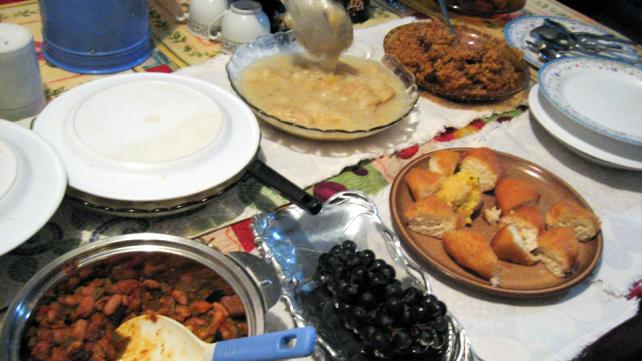
If you're in charge of cooking in your household, and it's usually women around the world who are, then you can feel like most of your Ramadan is spent over a hot stove instead of on a prayer mat.
I was once complaining to a friend of mine about how so many Muslim women seem to miss the blessings of Ramadan because of the overemphasis on great food at Iftar time. While I attributed this to a lack of consideration for the needs of women, my friend shared an interesting story.
She was originally from Egypt, and she recounted how her mother and the women in her neighborhood actually competed with each other in Ramadan over food. In other words, they vied for the title of "maker of the best Ka'k (cookies) this side of Alexandria." And this was despite the fact that male family members and even the Imam were encouraging women to share in the blessings of the month through prayer and mosque participation.
This Ramadan, let's remove our inner and outer obstacles to spiritual success.
At the inner level, let's start by ditching any feelings of guilt, competition or jealousy we may have for other sisters. You know who I'm talking about: the ones who can whip up a five-course Iftar plus dinner faster than you can say "what should I make for supper tonight?"The ones who can hold a full-time job, ferry their kids to extra-curricular activities and still hold grand Iftar parties at their homes.
Now we're ready to do something about the biggest outer obstacle to spiritual success every Ramadan: our families. We love them and yes, their demands for food high in fat, salt and sugar can be indulged once in a while in Ramadan. But doing this every Iftar seems to defeat the purpose of fasting in the first place. Remember, it's about self-control, even after we're allowed to eat.
An eight-step Ramadan plan for sisters
Here is a plan to help you gain more time in Ramadan for spiritual success:
- Call a family meeting-today. We've got barely a week until Ramadan begins. Choose a day and time when everyone can be present.
- Serve a sample Iftar menu at the meeting (I'll explain why in point 3)
- Start off the meeting with the food. Then once everyone is comfortable, explain very kindly that you will only be making this food five times this Ramadan: once a week and once when guests are invited over.
- When the news has sunk in, explain further to your family that you would like Ramadan to be a time for becoming closer to Allah. You cannot do this if you have to spend most of your time cooking and cleaning up after everyone. Be firm but polite.
- Discuss the Ramadan meal plan. Ask everyone to share what kind of dishes they would like to eat that are healthy.
- Once all the ideas are in, establish a cooking and cleaning schedule so that everyone pitches in. Explain that while you will still be doing the main cooking, other family members will have to help either with pre-Iftar arrangements (setting table, calling everyone, etc.) or post-Iftar ones (washing dishes/loading dishwasher, wiping counters, sweeping, etc.).
- Enforce the schedule by rewarding children. For younger kids, a chore chart with a sticker for each day of help offered could work, as well as a small toy or gift at the end of every successful two-week period. For older kids, you could promise to spend a whole day with them doing something they enjoy after Ramadan or extend a privilege they have (e.g. access to the car if they drive).
- For husbands, express your appreciation verbally by saying thank you and explaining how the extra help is a real spiritual boost.
If this plan is successfully implemented, you can extend it to the rest of the year, thereby gaining more time to focus on your spiritual needs. But even if you get more time on your prayer mat than over your stove just one month out of the year, the one where our good deeds count for more, it'll be worth the effort.
So go ahead. Turn off that stove and call that meeting!








Comments
Though I definitely agree
Though I definitely agree with the reality that our sisters must not be used as servants during Ramadhan (or any other time for that matter), and I also agree that during Ramadhan they should be allowed equal time to focus on their relationship with Allah and the purifying of their souls...there is a point that seems to be overlooked. Cooking, serving others and even cleaning up are all acts of worship if one has the appropriate intention. What is more, if the men are men and go out and work to support their families - even in the days of Ramadhan while they too are fasting (especially our brothers who must workin the heat) - is it then too much for the modernist mind to desire the women to prepare the nights meal for them? Unfortunately, we seem to want unnecessarily elaborate meals in Ramadhan - perhaps rather than decree she will only be cooking once or twice a week she can look for simpler dishes to prepare. Such an article simply points out some of the problems we are faceing in our communities...And the solutions, in my opinion, is not following western trends but going back to the methodologies found in the Qur'an, the sunnah and the ways of the Sahaba - even concerning the cooking during the month of Ramadhan.
Location
The response above seems more
The response above seems more fair and closer to the deen than the original suggestions. Cooking doesn’t need to be grand and only takes out an hour of the day. It in itself is an act of love and worship. Khidma shouldn’t be equated to slavery.
Location
Add new comment